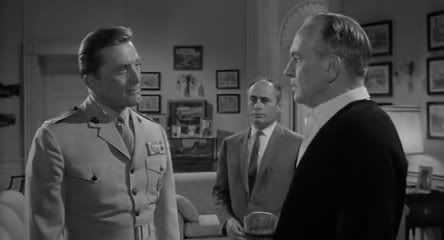Why in God's name do we elect a man president and then try to see how fast we can kill him?

Immediately after completing The Manchurian Candidate, John Frankenheimer returned to the well with the political thriller Seven Days in May, the second part of his '60s paranoid conspiracy trilogy (with the third part, of course, being Seconds). Even though it was released in 1964, it's still very much a timely story since it's about a liberal president whose approval ratings plummet after a controversial decision leaves him vulnerable to attacks from more conservative quarters. In this case, the point of contention is a nuclear disarmament pact with the Soviets, but it could have been just about anything, really. (It's highly unlikely that the subject of gay marriage would have come up back then, though.)
Also different: the president's policies inspire the chairman of the Joint Chiefs of Staff (played with steely determination by Burt Lancaster) to plan a coup which his aide (Kirk Douglas) catches wind of in time to warn the president (Fredric March) and his advisers (whose ranks include Edmond O'Brien, Martin Balsam and George Macready). Then it becomes a matter of digging up enough proof of the conspiracy to shut it down before the clock runs out. On the other side of the aisle, as it were, are Frankenheimer fixture Whit Bissell as a senator and Hugh Marlowe as a television commentator who are both In on It, and Ava Gardner as a Washington socialite whose extinguished love affair with Lancaster puts her in the unique position of being able to bring him down if it comes to that. The ace up Frankenheimer's sleeve, though, is Rod Serling's probing screenplay, which goes in for a few big speeches about patriotism and the American way of life, but that's what you hire Serling for. Pity they didn't work together again after this.